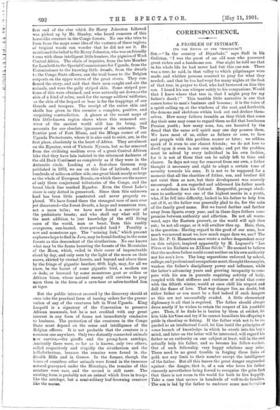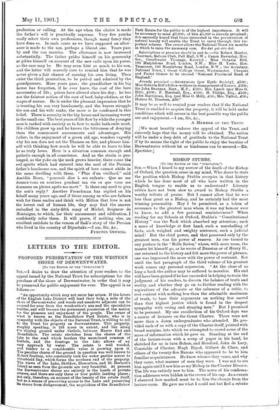CORRESPONDENCE.
A PROBLEM OF INTIMACY.
[To THE EDITOR OP THE "SPECTAT3R.1 SIR,—" In the country of Diyarbakr," says Sadi in his Gulistan, "I was the guest of an old man who possessed great riches and a handsome son. One night he told me that in his whole life he had never had but this one son. There was a tree, he said, in that valley to which pilgrimages were made, and whither persons resorted to pray for what they needed; and that he too had wept for many nights at the foot of that tree, in prayer to God, who had bestowed on him this son. I heard his son whisper softly to his companions, Would that I knew where that tree is, that I might pray for my father's death ! " This terrible little narrative is one that comes home to men's business and bosoms ; it is the voice of a spirit calling up at the windows of the soul, and forthwith the demons and skeletons within look out and declare them. selves. How many fathers tremble as they think that some day their sons may come to regard them as did that handsome Persian youth ; how many sons, too, are haunted by the dread that the same evil spirit may one day possess them. We have most of us, either as fathers or sons, to face and grapple with this problem sooner or later; we seldom speak of it even to our closest friends ; we do not love to dwell upon it even in our own minds; and yet the problem must be solved by every individual in his own fashion, for it is not of those that can be safely left to time and chance. In days not very far removed from our own, a father thought it necessary and right to adopt a certain tone of- severity towards his sons. It is not to be supposed for a moment that all the charities of father, son, and brother did not exist then as now, but their development was scarcely encouraged. A son regarded and addressed his father much as a subaltern does his Colonel. Respectful, prompt obedi- ence to authority was one of the highest merits in a youth, who, if he fell into difficulty, looked to his father to help him out of it, as the father was generally glad to do, for the sake of the family good name. But we travel farther and farther away from Sparta every year, and in these days fathers com- promise between authority and affection. Be not all worm- wood, says the Eastern proverb, or the world will spit thee out ; be not all sugar, or it will swallow thee up. Here, then; is the question: Having regard to the good of our sons, how much wormwood must we, how much sugar dare we, use? The late Mr. P. G. Hamerton once wrote a rather despondent essay on this subject, inspired apparently by M. Legouve's "Les Peres et les Enfants au XISme Siecle." He seemed to believe that the modern father could count neither on his own authority nor his son's love. The long separations enforced by school, college, and professional occupations must, thought the essayist, weaken the father's disciplinary power and influence, while the latter's advancing years and growing incapacity to com- pete with his son in pursuits . requiring activity of body, coupled with that stiffness and rustiness of mind that come with the fiftieth winter, would at once chill his respect and dull the flame of love. That way danger lies, no doubt, but either father or son must be a fool indeed if such dangers as this are not successfully evaded. A little elementary diplomacy is all that is required. The father should always dress neatly if he wishes to retain the respect of his youthful sons. Then, if he finds he is beaten by them at cricket, let him bide his time and try if he cannot humiliate his offspring's pride in shooting or fishing. If the father wish not to be re- garded as an intellectual fossil, let him instil the principles of some branch of knowledge in which he excels into his boy's mind, and later on the latter will be interested, will regard his father as an authority on one subject at least, will in the end actually help his father, and so become his fellow-worker. Out of such fellowship very happy relations may arise. There need be no great trouble in forging these links of gold, nor any limit to their number except the intelligence of the father. But all this leaves the great danger unguarded against : the danger, that is, of a son who loves his father sincerely nevertheless being forced to recognise the grim fact that there is not room in the world for both to live happily. Take a case that occurs in hundreds of well-to-do families. The son is led by the father to embrace some non-lueratire profession or calling. At the age when the choice is made the father's will is practically supreme. Very few youths really select their own professions, though many fancy they have done so. In such cases as we have supposed an allow- ance is made to the son, perhaps a liberal one. Years pass by and the son marries. The allowance is now increased substantially. The father prides himself on his generosity or pities himself on account of the new calls upon his purse, as the case may be. He may even hint as much to his son, and the latter will scarcely care to remind him that he was never given a fair chance of earning his own living. Then enter the third generation, to be petted and admired by the grandparents. More years pass; the grandfather in his big house has forgotten, if he ever knew, the cost of the bare necessaries of life; prices have altered since his day; he has not the faintest notion of the cost of beef, baby-clothes, or the wages of nurses. He is under the pleasant impression that he is treating his son very handsomely, and the braver struggle the son and his wife make, the more is he confirmed in this belief. There is serenity in the big house and increasing worry in the small one. The best years of life flow by while the younger man is racked with anxiety as to how to make both ends meet. His children grow up and he knows the bitterness of denying them the commonest amusements and advantages. His father, in the enjoyment of a green old age, wonders vaguely why his son does not set the Thames on fire, and pleases him- self with thinking how much he will be able to leave to him he so truly loves. Here is a situation common enough and pathetic enough in all conscience. And as the strain is pro- longed, as the yoke on tie neck grows heavier, there come the evil spirits which had entered into the soul of the Persian father's handsome son, and the spirit of love cannot abide in the same dwelling with them. "Plus d'un vieillard," said Amedee Roux, " pourrait dire A. see enfants : Que ne me donnez-vous en sourires pendant ma vie ce que vous me donnerez en pleura apres ma mort." Is there any need to give the son's reply? Another Frenchman has replied on his behalf many years ago, and if those among us who are fathers wish for these smiles and think with Milton that love is not the lowest end of human life, they may find the answer embodied in the sixty-fifth essay of Michel, Seigneur de Montaigne, to which, for their amusement and edification, I confidently refer them. It will prove, if nothing else, an excellent antidote to the venom of Sadi's story of the Persian who lived in the country of Diyarbakr.—I am, Sir, &c.,
FIINCTIIS OFFICIO.







































 Previous page
Previous page